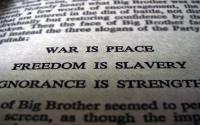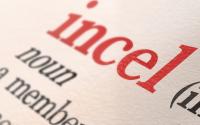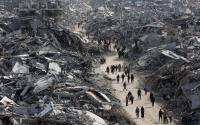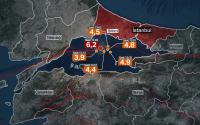12 July 2004
The Americans could learn a lot from Sheikh Jouwad Mehdi al-Khalasi. A tall, distinguished man who speaks with both eloquence and humour, he has the same forehead and piercing eyes of his grandfather - the man who led the Shia Muslim insurrection against British occupation in 1920.
He brings out a portrait of the grand old revolutionary who has a fluffy but carefully combed white beard. One of the most eminent scholars of his day, he ended his life in exile, negotiating with Lenin's Bolshevik government and dying mysteriously - poisoned, his supporters believed, by British intelligence.
Sheikh Jouwad's shoulders shake with laughter when I suggest that there are more than a few parallels between the Iraqi insurrections of 1920 and 2004. "Exactly," he says. "In 1920, the British tried to introduce an Iraqi government in name only - it looks like a copy of UN Security Council Resolution 1546. Sheikh Mehdi al-Khalasi had become the grand marja [the leading Shia scholar] after the death of Mohammed al-Shiazi and he issued a fatwa telling his followers and all Shias in Iraq not to participate in elections, not to give legitimacy to a government established by occupation forces.
"Not only the Shias responded to it but the Sunnis and the Jewish, Christian and other minorities as well. The elections failed and so the British forced my grandfather to leave Iraq. They arrested him at his home on the other side of this religious school where we are today - a home which many years later Saddam Hussein deliberately destroyed." It was a familiar colonial pattern. The British were exiling troublesome clerics - Archbishop Makarios of Cyprus comes to mind - throughout the 20th century, but Sheikh Mehdi turned out to be as dangerous abroad as he had been at home. He was transported to Bombay, but so great was the crowd of angry Indian Muslims who arrived at the port that British troops kept him on board ship and then transported him to Aden.
Sheikh Jouwad continues: "He said to the British, 'You don't know where to send me - but since the pilgrimage season is close, I want to go on the haj to Mecca'. Now, when Sherif Hussein, the ruler, heard this, he sent an invitation for my grandfather to attend the haj. He met Sherif Hussein on Arafat Mountain at Mecca. And then he received an invitation to go to Iran, signed by the Foreign Minister, Mohammed Mossadeq. And in Iran, waiting for him, were many religious leaders from Najaf."
Thirty years later, the Americans would topple Mossadeq's Iranian government - with help from MI6.
Sheikh Jouwad uses his hands when he talks - Shia prelates are far more expressive with their hands than Anglican clergymen - and each new episode in his grandfather's life produces a pointed finger. "When Sheikh Mehdi al-Khalasi arrived at the Iranian port of Bushehr, he received a big welcome but an official of the Iranian Oil Company fired 10 bullets at him," he says. "Many people said at the time that this was a plot by Colonel Wilson, who had been the head of the British occupation in Iraq in 1920. All the great religious leaders from Qom in Iran were waiting for him - Al-Naini and al-Asfahani, Sheikh Abdulhalim al-Hoeri al-Yezdi - who was the professor of the future Ayatollah Khomeini - and then King Faisal, whom the British had set up in Baghdad, announced that exiled religious leaders could return to Iraq - providing they promised not to interfere in politics."
Sheikh Mehdi angrily dismissed the invitation as "an attack on our role as religious leaders and on the independence of Iraq". Instead, he travelled to the north-eastern Iranian city of Mashad and established there an assembly "to protect the holy places of Iraq", publishing treatises in Arabic, Persian, Urdu, Russian and Turkish.
"There was even an indirect dialogue between my grandfather and the Bolshevik revolutionaries of Lenin," Sheikh Jouwad says. "They wanted to use difficulties in the international situation to help Iraq to become a really independent country. There would be a revolution in Iraq. That was the idea. But then in 1925, he suddenly died. They claimed he had a disease. But my father always believed that the British consul in Mashad had Sheikh Mehdi poisoned. On the afternoon that he died, the consul had invited all the doctors in Mashad to a reception outside the city and so, when my grandfather became ill, no one could find a doctor and there was no one to care for him." And now, I ask Sheikh Jouwad? What of Iraq now? He chairs the Iraqi Islamic Conference - which combines Shia and Sunni intellectuals - and which is demanding independence for Iraq, just as Sheikh Jouwad's grandfather did more than 80 years ago.
"The Shias will not separate and they will not isolate themselves from the Sunni. They will have their rights when all the people of Iraq have rights. We have the right also to resist occupation in different ways and we do so politically. The Americans want civil war - but they will fail because the Iraqi people will refuse to fall into civil war."
And what of Saddam's first appearance in court? The Sheikh laughs again. "Saddam said it was a theatre and that Bush was a criminal. This was true. But when the judge talked about the gassings he committed at Halabja, this was also the truth."






